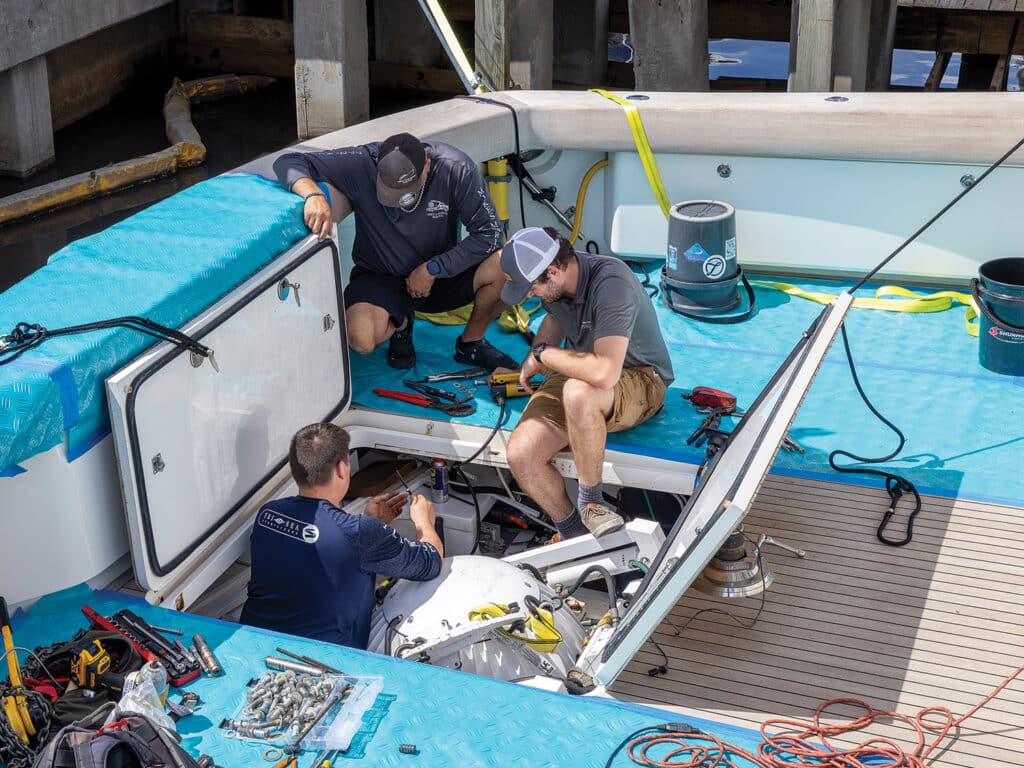
Special delivery: Sign up for the free Marlin email newsletter. Subscribe to Marlin magazine and get a year of highly collectible, keepsake editions – plus access to the digital edition and archives.
Perhaps the most critical juncture in a vessel purchase is what is known as the accept/reject date, at which time a buyer must determine whether to move forward with a vessel under contract. This particular deadline comes after the parties have entered into an agreement and the buyer has performed their due diligence on the vessel, including personal inspections, sea trials, and hull and machinery surveys. The due diligence period typically uncovers some form of deficiencies on the vessel, and it then becomes a negotiation between the parties as to how those should be addressed prior to closing.
Buyer’s Options
A buyer must weigh the importance and value of survey deficiencies and determine whether to accept the vessel or terminate the contract. If choosing to move forward, the buyer can take the boat as is or present a conditional acceptance with specific terms that must be met by the seller prior to or even after closing. Of course, the buyer must also consider market conditions, the level of demand for a particular vessel and a variety of other factors before determining how to proceed.
Many of the transactions we handle involve the negotiation of a conditional acceptance between the parties, including price reductions, repairs or perhaps a combination of both. However, a transaction is far from over if the parties approach this juncture incorrectly, agree to a poorly drafted document or let their pride get in the way of an otherwise reasonable approach to closing.
Price Reduction or Not?
Clients often ask how they should approach a conditional acceptance and whether they should negotiate a price reduction or request that deficiencies are corrected prior to closing. As is often the case, the answer is, “It depends.”
An agreed-upon price reduction has a few advantages, but only when it is appropriate for the situation. To begin with, a price reduction often allows for a quicker transfer of ownership and prevents the parties from extending the closing date to give the seller time to perform repairs. A price reduction also keeps money in the pocket of the buyer to address repairs or maintenance as they wish. Therefore, price reductions often lead to a cleaner closing with less room for disputes. In truth, a seller typically has less incentive to perform a repair to the standard of a buyer who will imminently be taking ownership of the vessel.
However, a price reduction simply isn’t practical in all scenarios during a purchase. For example, it’s often not sensible if the cost to repair a survey deficiency is difficult to estimate, putting the buyer in a situation where they could spend considerably more than predicted. A price reduction may also be irrational if a vessel requires repairs or maintenance that prohibits its use for an extended or unknown length of time. In such a case, a buyer is often unwilling to take on the usual carrying costs, such as dockage, insurance and crew costs, without being able to use the vessel.
Read Next: Managing For Sale By Owner Boat Transactions.
Who Makes the Decision?
It is important from the buyer’s standpoint to structure the conditional acceptance in a clear and objective manner if survey deficiencies are to be addressed by the seller. Perhaps most importantly, it should be agreed upon in writing how the repairs or survey deficiencies will be deemed completed. I often see language in a draft conditional acceptance simply listing the survey deficiencies to be corrected without important context or detail. It should be clear in writing who is responsible for assessing the repairs and whether they have been done properly. Otherwise, the repairs and how they should be addressed can become contentious between the buyer and seller.
Regardless of the route taken, the parties should focus on the approach that is most logical given the circumstances and heed the advice of their brokers, surveyors and attorneys, as relevant.
Raleigh P. Watson is a contributing author, and a Partner at Miller Watson Maritime Attorneys.







